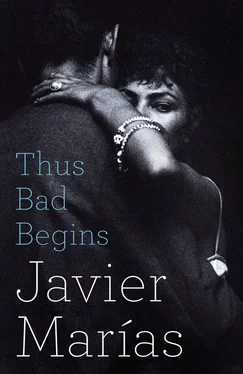‘I’m not insinuating anything, Doctor, nor do I have anything to do with any hard-line Franco supporters. I don’t know a single one.’ I addressed him by his title this time, in a friendly fashion, but I wanted him also to feel a certain coldness on my part. ‘I’m just remembering something you said to me once and making a few connections.’
‘What did I say? I’ve never said anything of the sort.’
‘You were speaking about women and how to get them into bed, Maestro,’ I said. We forget more of what comes out of our mouths than what enters our ears, and so he had no idea what I was talking about. ‘You said: “There’s nothing more satisfying than when a girl doesn’t want to do it, but can’t say No.” And then you spoke about the resentment they feel because “the very first time, they had no choice”. That, more or less, is what you said. “Obliged”, you said. “But can’t say No”, you said.’ I repeated what he had said, underlined it. ‘What other interpretation could I give those words?’
The Doctor hesitated for a few seconds. In the light of what I had been told and what he had guessed, in the light of the vengeful rumours spread, according to him, by former comrades, those words sounded very bad, even though they had been spoken at a different time and in another context. He must have realized that they sounded almost like a confession, an acknowledgement, he must have seen them as ugly and besmirching. He recovered at once, however, and laughed out loud, all congeniality and good nature, revealing his healthy, dazzling teeth in all their glory, his protuberant chin gleaming.
‘What nonsense is this, Juan? I was just talking for the sake of it and we were joking, weren’t we, you were pulling my leg. You’ve certainly got a good memory, though. I’d completely forgotten ever having said that. I was talking about the kind of girls who go all prudish and play hard to get and object if you insist, so as not to appear too easy if they’re young, or adulterous if they’re married. Every married woman will tell you: “It’s the first time anything like this has ever happened to me, I can’t understand why it’s happening now.” They need you to believe it or to believe it themselves. And of course you pretend to believe them, so that they can feel they emerge from the situation smelling of roses and generally feel relaxed about the whole thing. Women may be less fastidious nowadays, but it was different in my youth. And young women, girls like your friends, for example, have to justify it to themselves before they give in to someone like me, a man twice their age or more, someone they consider to be an old man: he begged me, he insisted, he tricked me, he made me feel sorry for him. It’s all a matter of flattering them. That’s all I meant. And there you go putting a sinister interpretation on it. You and your conspiracy theories.’ And he slapped me on the arm with his great hand, and either he misjudged it or else he did so on purpose, because it really hurt, and I saw that he hadn’t intended it as a friendly gesture at all. He tried to pass it off as one, fixing me with his unvaryingly cordial smile, his large, rectangular incisors, that smile that had so eased his way with mothers and children and his superiors. But the smile wasn’t cordial at all, it was angry and possibly alarmed.
I came very close to pitying him for having suddenly to consider himself an old man and having to admit it openly, someone reduced to spending what remained of his life merely admiring — or possibly entreating — not only young women, but almost any woman. Successful men take their decay very hard, it’s not easy to recover from rejection if you’re not used to it. I realized, too, that he was one of those men whom old age betrays by failing to teach them the usual lessons or quieting their passions and, instead, preserves their ambition and their energy rather than making them slower or more docile. And so it gradually undermines them, but without giving them any warning. I shook off that shadow of pity, however; after all, how could a man so unaware of the passage of time suddenly present himself as time’s victim in the middle of a conversation that was highly embarrassing for him? I thought: ‘He’s resorting to trickery, he’s defending himself. There is, as I’ve always felt, something voracious and troubling about him, and I mustn’t allow myself to be deceived.’ And in view of his denial, I decided, without further delay, to mention the third name and not bother waiting for some meandering path that would lead me to the Sanctuary:
‘You’re a religious man, Jorge.’
This was half-statement, half-question. And whichever it was, he was momentarily taken aback. His laugh lingered on a little, like a mechanism that takes a while to stop. But if it had been a cadaverous laugh to begin with, it was now the laugh of a dead man.
‘What’s that got to do with anything? What kind of a question is that?’
‘I’ve seen you at the Sanctuary of Our Lady of Darmstadt, and so I assume you’re very religious. You must be extremely devout to belong to the Apostolic Movement.’
His expression changed, he cancelled that now defunct smile and buried it once and for all, or at least for what remained of the night. He clearly didn’t like me knowing that fact.
‘You’ve seen me there? Seen me doing what?’ His tone of voice was one of fear and scepticism.
‘I often go to the Museo Lázaro Galdiano, which is almost next door.’ I hesitated. I waited. What emerged from my lips next was not what I was planning to say at all, it simply escaped my wretched tongue. ‘I saw you with Beatriz. I saw you in your consulting room.’
There was no jokey shove this time, that belonged to quite another sphere of behaviour. He took advantage of the fact that we were sitting on one of Bar Chicote’s semicircular seats — almost like seats on a train or a tram — to place one of his large hands on my shoulder. As I said, when he did this apparently affectionately, it was as if his great paw had fallen from a considerable height and then gripped me like claws or talons, provoking in me an immediate urge to shrug it off and free myself from both its weight and grip. This time it was worse, I experienced a real pressure, an unmistakable threat. Van Vechten was strong and well built, he was, you might say, squeezing my shoulder, twisting it, bearing down on me, so much so that I felt I wouldn’t be able to get up from my seat, that my whole body was powerless against that great weight. He was really hurting me, more than he had before and the pain was more prolonged. I imagined how that hand would have rested on the shoulders of the timid, while he gave them two options: ‘So it’s up to you: you either have a bit of a hard time accepting my conditions or you stop having any time at all, either good, bad or indifferent.’ And he whispered in a very slow, unnaturally calm voice (but since he was normally such an expansive man, he was unused to whispering and his voice sounded like sandpaper):
‘Listen, young De Vere, just watch what you say. Be very careful what you tell people. You wouldn’t want to harm someone you shouldn’t harm. Or even several people.’
I managed to slide sideways to the other end of the semicircular seat, beyond his reach. An old waiter with a napkin draped over one arm was keeping a watchful eye on us, he must have been sensitive to any tensions, able to sniff out a brawl before it happened. Van Vechten wasn’t going to intimidate me, young people are such unconscious beings that they often fail to notice when they’re in danger. And I was convinced I was in charge of the situation. I even thought he might offer me something in exchange for my silence, once his anger had passed and he had recovered from the shock.
Читать дальше












